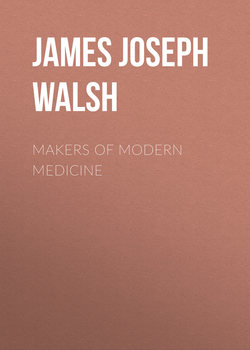Makers of Modern Medicine

Реклама. ООО «ЛитРес», ИНН: 7719571260.
Оглавление
James Joseph Walsh. Makers of Modern Medicine
PREFACE
THE MAKING OF MEDICINE
MORGAGNI, THE FATHER OF PATHOLOGY
AUENBRUGGER, THE INVENTOR OF PHYSICAL DIAGNOSIS
EDWARD JENNER, THE DISCOVERER OF VACCINATION
GALVANI, FOUNDER OF ANIMAL ELECTRICITY
LAENNEC, MARTYR TO SCIENCE
THE IRISH SCHOOL OF MEDICINE6
JOHANN MÜLLER, FATHER OF GERMAN MEDICINE
THEODORE SCHWANN, FATHER OF THE CELL DOCTRINE
CLAUDE BERNARD, PHYSIOLOGIST
PASTEUR, FATHER OF PREVENTIVE MEDICINE
JOSEPH O'DWYER, THE INVENTOR OF INTUBATION
Отрывок из книги
Our generation, in this no more self-concentrated than many another, has prided itself so much on the progress it has achieved in science that it has in its interest in the insistent present rather neglected the claims of the history of science. There has been the feeling that our contemporaries and immediate predecessors have accomplished so much as to put us far beyond the past and its workers, so that it would seem almost a waste of time to rehearse the crude notions with which they occupied themselves. In no one of the sciences is this truer than in medicine. Yet it seems likely that no more chastening influence on the zeal for the novel in science, which so often has led this generation astray, could possibly be exerted than that which will surely follow from adequate knowledge of scientific history. In medicine there is no doubt at all that an intimate acquaintance with the work of the great medical men of the past would save many a useless investigation into problems that have already been thoroughly investigated, or at least would help modern workers to begin at a place much farther on in their researches than is often the custom.
There are other reasons why the knowledge of the history of medicine cannot but prove of great service to the present generation. We are entering upon a time when original research as the main business of selected lives, in contra-distinction to the few hours a day or even a week that the medical practitioners of a few generations ago could steal from their busy lives, is becoming more and more the rule. A consideration then of the methods by which advances in medicine were made in the past, of the character of the men to whom we owe the ground-breaking discoveries, of the way in which such discoveries were accepted or rather rejected by contemporaries, for rejection was almost the rule, will serve as a mirror for reflections that will surely be helpful in this day of great institutions of research. It must not be forgotten, however, that only too often in the past it is in the large institutions that routine work has been done, while the occasional genius has sprung up in circumstances that seemed quite unlikely to be the fostering mother of originality, and there has taken for the world the precious step into the unknown which represents a new departure in medical science.
.....
This would seem to point to the fact that Morgagni suspected there were other connections between the special senses and important organs besides those which had been discovered by anatomists up to that time. As a matter of fact the so-called sympathetic nervous system does place all the organs of special sense in direct connection with the other important organs of the body. Morgagni's suspicions were to be confirmed by the discoveries made in this sympathetic system during the succeeding century.
Morgagni first of all seems to have realized what was the mechanism by which alcohol injures the human system. He pointed out that the excitation of the heart due to the action of alcohol was reflected in an overdistention of the arteries. This overdistention gradually led to degenerations in the arterial walls. The loss of elasticity thus induced brought on a disturbance of the circulation in the important organs of the body, and so gave rise to symptoms of wide-spread interference with organic functions.
.....